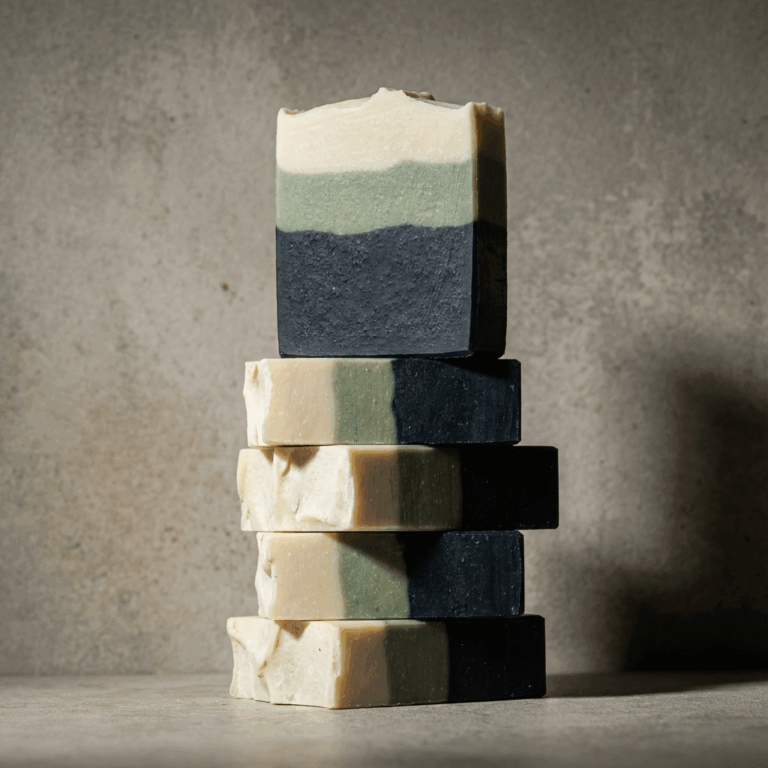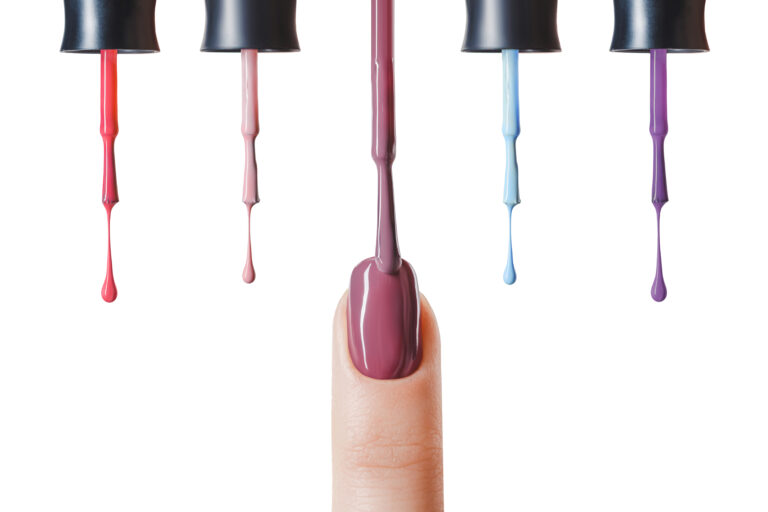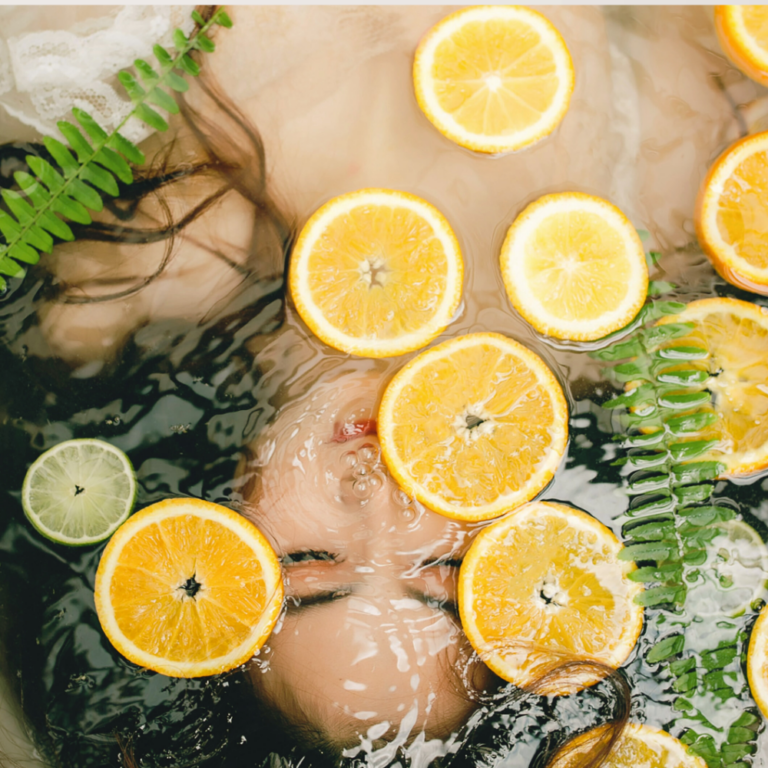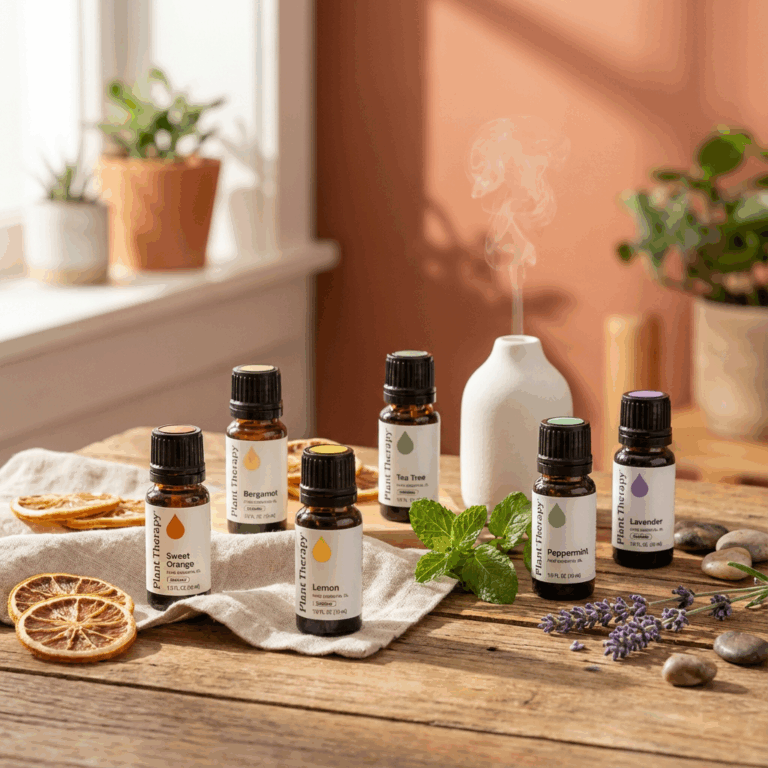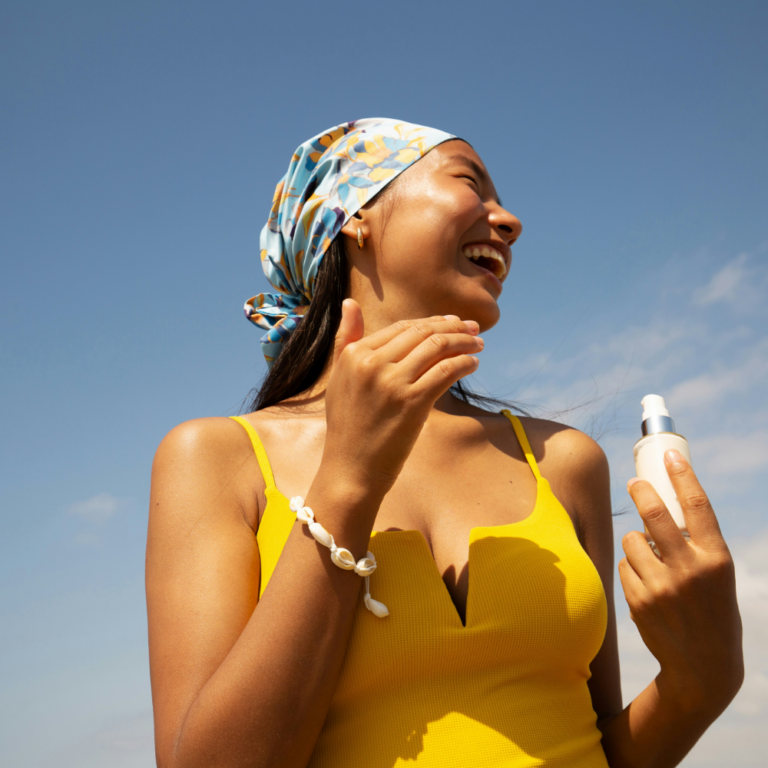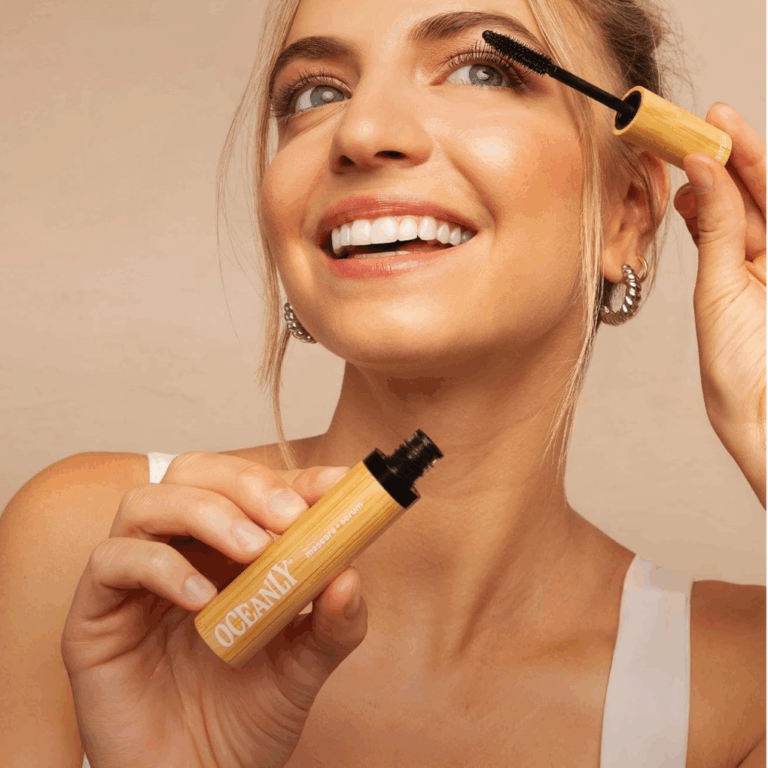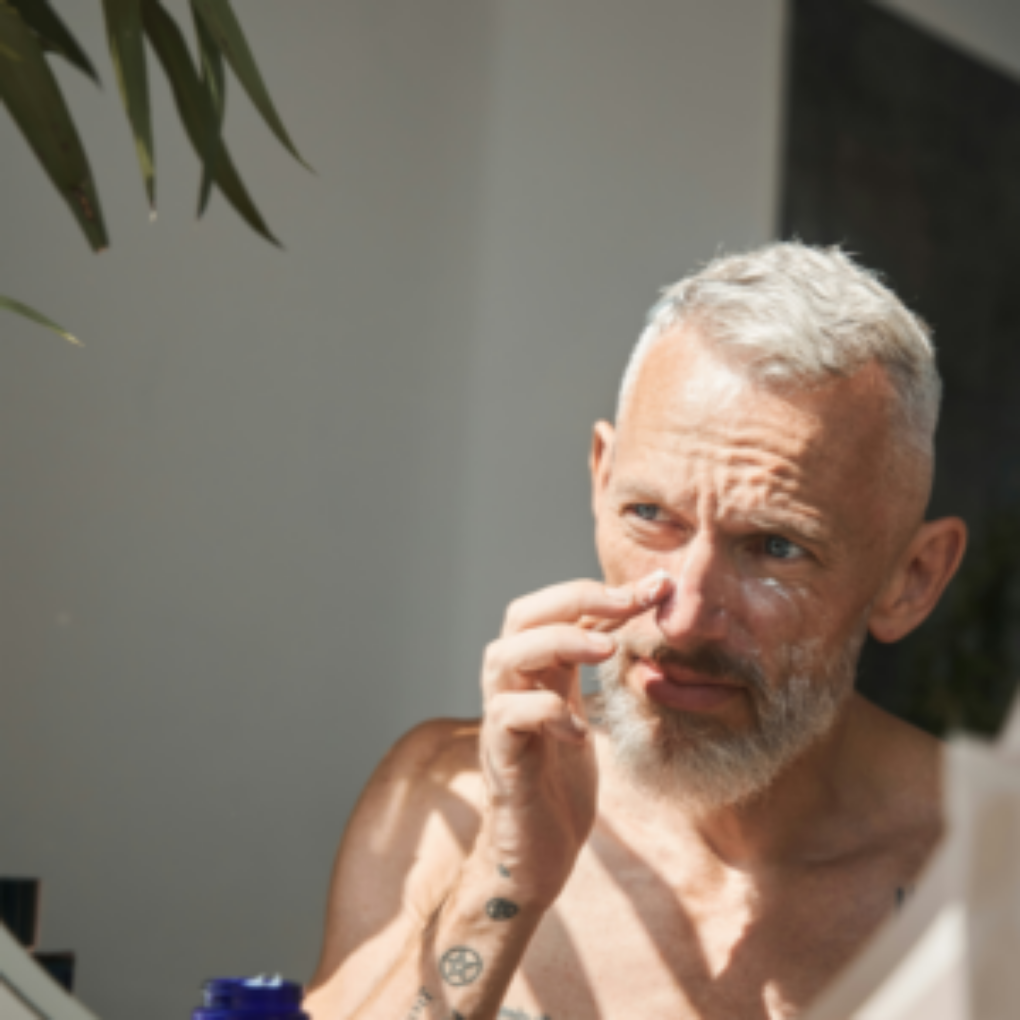
Key Takeaways
- The best men’s anti-aging products use proven ingredients like retinol, peptides, and hyaluronic acid to reduce wrinkles and improve skin health.
- Non-toxic formulas avoid harsh chemicals, keeping skincare safe for long-term use.
- Eco-conscious brands now offer effective, sustainable options that protect both your skin and the planet.
Let’s face it—men’s skincare has come a long way from the days of using a bar of soap and whatever lotion happened to be lying around. Today, the best men’s anti-aging products promise to smooth wrinkles, boost collagen, and keep skin looking healthy well into your 40s, 50s, and beyond.
But here’s the truth: not all products are created equal. Some rely on harsh chemicals or heavy fragrances that can irritate skin, while others come in packaging that lingers in landfills for decades. Choosing the wrong formula isn’t just ineffective, it can be bad for both your skin and the planet.
Research shows that proven ingredients like retinol, peptides, and hyaluronic acid truly make a difference by stimulating collagen, improving texture, and firming the skin. That’s why the best approach is to look for non-toxic, sustainable products that deliver results without compromise.
In this guide, we’ll cover everything you need to know: what anti-aging products are, why men benefit from them, the key ingredients that actually work, and how to build a simple, effective routine. Plus, you’ll find our top recommendations for non-toxic anti-aging products for men that are safe, effective, and eco-friendly.
What Are Anti-Aging Products for Men?
Anti-aging products for men are skincare formulas designed to slow or reduce visible signs of aging, like fine lines, wrinkles, sagging, dark spots, and dryness. While the marketing might make them seem complicated, most of these products work by supporting your skin’s natural defenses and helping it repair damage over time.
How they work:
- Boosting collagen production: Retinol, peptides, and vitamin C stimulate your skin’s collagen matrix, which gives skin its firmness and elasticity.
- Fighting free radicals: Antioxidants like CoQ10, vitamin E, and green tea extract protect against oxidative stress caused by UV rays and pollution.
- Restoring hydration: Ingredients such as hyaluronic acid and ceramides draw in moisture and strengthen the skin barrier, reducing dryness and flaking.
- Gentle resurfacing: Alpha hydroxy acids (AHAs) and niacinamide smooth rough patches and even skin tone through mild exfoliation.
- UV protection: Sunscreens and moisturizers with SPF shield skin from photoaging, the number one cause of premature wrinkles.
Common misconceptions:
- “Anti-aging products are only for women.” Not true, men’s skin is actually thicker and oilier, meaning it can show deeper wrinkles if not cared for.
- “You only need them after wrinkles appear.” Prevention is more effective than correction; starting in your late 20s or early 30s helps maintain healthy skin long-term.
- “They’re too complicated or time-consuming.” Most men can build an effective routine with just three steps: cleanse, treat (serum or cream), and moisturize with SPF.
Anti-aging products for men aren’t about turning back time; they’re about slowing visible aging, protecting skin health, and building confidence with a routine that works.
Why Should Men Use Anti-Aging Products?
Men’s skin is different from women’s, and that means the way it ages is different, too. Testosterone makes men’s skin about 25% thicker, with larger pores and more active oil glands. While this can delay the appearance of fine lines, it also makes men more prone to deeper wrinkles, sagging, and breakouts over time.
The most common aging concerns for men include:
- Forehead and eye wrinkles: Repeated facial expressions, combined with thinner skin around the eyes, make lines more noticeable.
- Sagging and loss of firmness: Collagen and elastin naturally decline with age, leading to looser skin around the jawline and cheeks.
- Sun damage and dark spots: Men are less likely to use sunscreen regularly, which accelerates photoaging.
- Dryness and irritation: Shaving, harsh cleansers, and environmental stressors strip the skin barrier, leading to flaking and sensitivity.
Starting an anti-aging routine early has real advantages. By your late 20s and early 30s, collagen levels are already declining. Consistently using the right products can help preserve elasticity, reduce long-term damage, and keep skin looking healthy and balanced.
In other words, anti-aging products aren’t just about appearances—they’re about protecting skin health, preventing premature damage, and maintaining confidence as you age.
Reading the ingredient list is one of the most essential steps in choosing a safe and effective anti-aging product. Marketing claims on the label can be misleading, but the ingredients never lie. Below is a straightforward guide to what you should prioritize and what you should steer clear of.
Suitability and Target Users: Who Should Use Anti-Aging Products?
Anti-aging products aren’t just for men with deep wrinkles. They can benefit different people at different stages, depending on age, skin type, and lifestyle. Knowing who they’re best for makes it easier to choose products that deliver real results without unnecessary irritation.
Who Benefits Most
These products are useful for more than one kind of man. They’re especially helpful for:
- Men noticing the first signs of aging such as fine lines, dullness, or uneven tone.
- Those with visible sun damage from years of outdoor work, sports, or travel.
- Anyone who wants to keep their skin healthy and resilient as they age.
Best by Skin Type
Not every product works for every skin type. Choosing the right match makes a big difference in comfort and results.
| Skin Type | Recommended Product Features |
|---|---|
| Dry Skin | Rich creams and serums with hyaluronic acid, ceramides, or peptides to deeply hydrate |
| Oily or Acne-Prone Skin | Lightweight, oil-free, non-comedogenic formulas with niacinamide or gel-based textures |
| Sensitive Skin | Fragrance-free, hypoallergenic products with aloe, green tea, or oat extract. Start with gentle actives before stronger ones like retinol |
| Combination Skin | Richer moisturizers on dry zones (cheeks, forehead) and lighter, oil-free products on oily areas (nose, chin) |
Age Considerations
Anti-aging isn’t only about correction. Prevention is just as important.
- Late 20s to 30s: Focus on prevention with sunscreen, antioxidants, and lightweight moisturizers to slow the first signs of aging.
- 40s and beyond: Target visible issues such as wrinkles, sagging, and dark spots with retinol, peptides, and specialized serums.
Lifestyle and Environmental Factors
Your daily habits and environment also affect how quickly your skin ages. Men with high sun exposure, ongoing stress, lack of sleep, or heavy pollution in their environment may see signs of aging earlier. In these cases, a consistent anti-aging routine can make a big difference.
What to Look For and What to Skip in Men’s Skincare
Not every ingredient in skincare works in your favor. Some deliver proven anti-aging results, while others can irritate your skin or even harm the environment. Knowing what to look for and what to skip makes it easier to choose products that are safe, and effective
✅ Do Look For
- Retinol and Retinoids — support collagen production and improve skin texture.
- Peptides — help firm the skin and reduce the appearance of fine lines.
- Hyaluronic Acid — hydrates and plumps, making skin look smoother.
- Antioxidants (Vitamin C, Vitamin E, Green Tea, CoQ10) — protect against free radical damage and brighten the skin.
- Niacinamide — balances oil, reduces redness, and strengthens the skin barrier.
- Bakuchiol — a natural alternative to retinol for sensitive skin.
- Ceramides — restore hydration and repair the skin barrier.
- Mineral Sunscreens (Zinc Oxide, Titanium Dioxide) — provide broad-spectrum UV protection without harsh chemicals.
❌ Don’t Use
- Microplastics such as polyethylene (PE), polypropylene (PP), or polyethylene terephthalate (PET) — common in creams and scrubs, where they can persist in the environment and may irritate skin.
- Parabens — preservatives linked to hormone disruption.
- Phthalates — often hidden under “fragrance,” also linked to hormone disruption.
- Sulfates — harsh cleansers that strip natural oils and weaken the skin barrier.
- Synthetic Fragrances — may cause redness, itching, or irritation.
- Chemical Sunscreens (oxybenzone, octinoxate, homosalate) — can trigger irritation and raise concerns about hormone disruption.
- Products Without Transparency — formulas lacking ingredient lists or third-party safety testing should be avoided.
Types of Anti-Aging Products for Men
Once you understand which ingredients work, the next step is knowing which product types deliver them most effectively. Men’s anti-aging products generally fall into a few categories, each serving a specific purpose in a skincare routine.
🧴 Moisturizers
Hydrating creams or lotions that lock in moisture, strengthen the skin barrier, and often include antioxidants or peptides. A good daily moisturizer helps prevent dryness and reduces the appearance of fine lines.
💧 Serums
These formulas are lightweight and feature a high concentration of active ingredients, such as retinol, vitamin C, or hyaluronic acid. Serums absorb quickly and target concerns like wrinkles, dark spots, or uneven tone.
👁️ Eye Creams
The skin around the eyes is thinner and more prone to wrinkles, puffiness, and dark circles. Anti-aging eye creams are specially formulated to address these issues with ingredients like peptides, retinol alternatives, linseed extract, or rye seed extract. Some formulas come as roll-on gels or eye sticks for easy application.
🌞 Sunscreens
UV exposure is the leading cause of premature skin aging. Daily use of a broad-spectrum sunscreen (SPF 30 or higher) prevents photoaging and protects skin from further damage. Mineral-based sunscreens with zinc oxide or titanium dioxide are the safest, non-toxic options.
💪 Body-Focused Products (Optional)
Although most anti-aging products target the face, body creams or balms enriched with peptides or ceramides can help firm skin and maintain hydration on the chest, neck, and hands, where aging often shows first.
How to Build a Simple, Effective Anti-Aging Routine
An anti-aging routine doesn’t need to be complicated. With just a few steps morning and night, you can protect your skin from damage, improve its resilience, and reduce visible signs of aging.
🌅 Morning Routine
- Cleanser — Use a gentle face wash to remove oil and impurities without stripping the skin.
- Antioxidant Serum — Vitamin C or niacinamide in the morning helps defend against pollution and UV damage.
- Moisturizer — Choose a lightweight cream with peptides or ceramides to hydrate and strengthen the skin barrier.
- Sunscreen — Apply a broad-spectrum SPF 30 or higher every day, even if it’s cloudy. Sunscreen is the single most effective anti-aging product you can use.
🌙 Night Routine
- Cleanser — Wash away the day’s buildup of dirt, oil, and sunscreen.
- Treatment Serum — Use retinol or a peptide serum to stimulate collagen and speed up cell renewal. If your skin is sensitive, start with bakuchiol as a gentler alternative.
- Eye Cream — Apply a formula designed for crow’s feet, dark circles, or puffiness. Look for ingredients like linseed extract or retinol alternatives.
- Moisturizer — End with a nourishing cream that locks in hydration and supports overnight repair.
✨tips
Skincare Success
- Tailor your routine to your skin type. For oily skin, choose lighter, gel-based products. For dry or sensitive skin, opt for richer, fragrance-free creams.
- Start slowly with retinol or AHAs to minimize redness or flaking. Apply them only a few nights a week until your skin adjusts.
- Be consistent. Most anti-aging products take 6 to 12 weeks of regular use to show visible results.
5 Non-Toxic Anti-Aging Products for Men
ATTITUDE Oceanly Phyto-Age Night Cream
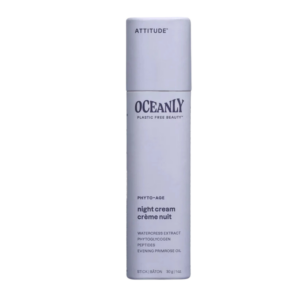
ATTITUDE’s Pro-Aging Solid Face Cream combines powerful, plant-based ingredients to hydrate and reduce signs of aging. It’s packaged in an eco-friendly, plastic-free tube, making it a sustainable skincare choice.
Key Features
- Peptides and watercress extract help reduce fine lines and improve skin elasticity.
- Hydrating formula for a youthful, smooth complexion.
- Vegan, cruelty-free, and free from synthetic fragrances.
Packaging
- FSC-certified Cardboard
- Biodegradable Ink
- Biodegradable Protective Coat
Certifications
Dr. Louie Revitalizing All-in-One Essence
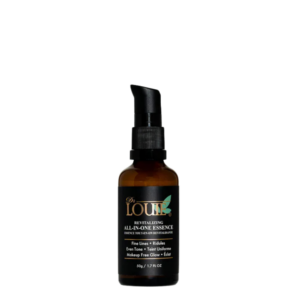
Dr. Louie’s All-in-One Essence is a streamlined skincare solution that combines the benefits of toner, serum, and moisturizer into one product. Designed to simplify skincare routines, it hydrates, nourishes, and protects the skin while minimizing chemical exposure by eliminating the need for multiple products.
Key Features
- Combines toner, serum, and moisturizer into one formula for comprehensive hydration.
- Reduces the risk of chemical overload with a minimalist approach.
- Uses Dr. Louie’s Self-Preservation System to keep the product fresh without harsh preservatives.
Packaging
- Glass bottle
- Plastic pump
Certifications
Alder New York Nourishing Cream
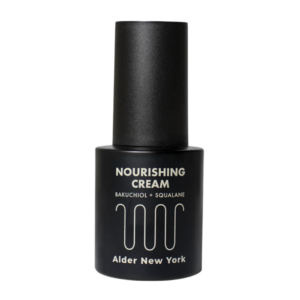
Alder New York’s Nourishing Cream is a daily moisturizer that combines the benefits of toner, serum, and moisturizer into one product. Formulated with bakuchiol, a natural alternative to retinol, along with vegan squalane and jojoba oil, it hydrates the skin and reduces the appearance of fine lines and wrinkles
Key Features
- Bakuchiol: A plant-derived compound that offers anti-aging benefits similar to retinol without the associated irritation.
- Vegan Squalane: A lightweight moisturizer that locks in hydration without clogging pores.
- Jojoba Oil: Mimics the skin’s natural oils, providing deep hydration and promoting a healthy skin barrier.
- Vitamin E: An antioxidant that protects the skin from environmental stressors and supports overall skin health.
Packaging
- Bottle is made from 30% recycled plastic content
- Carton is made from 100% recycled FSC certified paper
Certifications
True Botanicals Chebula Active Serum
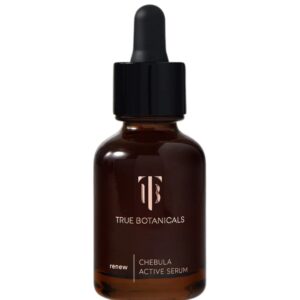
True Botanicals’ Chebula Active Serum is an antioxidant-rich, unisex anti-aging serum designed to hydrate, brighten, and protect the skin. Formulated with Chebula, one of the most powerful antioxidants in skincare, this serum helps combat fine lines, uneven tone, and loss of firmness while supporting long-term skin health.
Key Features
- Targets five signs of aging with antioxidant-rich Chebula
- Hydrates and plumps with hyaluronic acid and aloe vera
- Protects against environmental damage with green tea extract
- Lightweight, non-greasy formula suitable for all skin types
- Free from parabens, phthalates, sulfates, and synthetic fragrances
Packaging
- Recyclable glass containers with minimal plastic use
- Certified plastic-negative (offsetting more plastic than they use)
- 100% FSC-certified paper cartons
Certifications
- Made Safe Certified
- Pregnancy Approved powered by MADE SAFE
- EWG VERIFIED™
- Microbiome.info Friendly
- Peta Approved
- Leaping Bunny
- Pact
OSEA Anti-Aging Body Balm
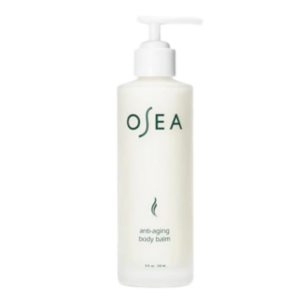
OSEA is one of my favorite skincare brands, and their Anti-Aging Body Balm does not disappoint. This rich, luxurious moisturizer combines the hydration of a lotion with the nourishment of body oil. It feels incredibly smooth on the skin, absorbing beautifully without feeling greasy. Infused with seaweed, botanical oils, and antioxidants, it helps improve skin elasticity, firmness, and overall radiance. I highly recommend this product!
Key Features
- Hydrates and firms with Undaria seaweed and coconut oil.
- Boosts skin elasticity with passion fruit and acai oils.
- Rich in antioxidants to combat signs of aging.
- Absorbs quickly, leaving skin soft and radiant without a greasy feel.
- Protects against environmental damage with green tea extract
- Lightweight, non-greasy formula suitable for all skin types
- Free from parabens, phthalates, sulfates, and synthetic fragrances
Packaging
- Recyclable glass bottle
- Plastic pump
Certifications
Do Anti-Aging Products Need to Be “For Men”?
Many products marketed to men are very similar to those labeled for women or unisex. The main differences often come down to packaging, fragrance, and texture. For example, men’s creams may feel lighter or have a more “neutral” scent, while women’s products may lean floral or richer in texture.
What really matters are the ingredients and formulation, not the gendered marketing. A high-quality antioxidant serum or retinol cream will work on men’s skin just as effectively as it does on women’s.
If you find a unisex or women’s product that contains the right active ingredients and feels comfortable on your skin, there’s no reason not to use it. The key is choosing products that match your skin type and concerns rather than relying solely on gendered branding.
The Importance of Non-Toxic, Sustainable Skincare
Choosing safe, eco-conscious products is about more than appearances. The ingredients you apply to your skin are absorbed into the body, and the packaging you throw away has long-term effects on the planet.
Why ingredient safety matters
Some conventional anti-aging products contain parabens, phthalates, synthetic fragrances, and even microplastics. These ingredients may cause irritation, disrupt hormones, or persist in the environment long after you rinse them down the drain. Non-toxic formulas avoid these risks and support overall health.
Why sustainability matters
The beauty industry generates millions of tons of plastic waste every year, much of it from single-use packaging. Brands that use recyclable containers, refillable systems, or biodegradable materials help reduce the environmental burden.
What to look for
- Certifications like EWG Verified, Leaping Bunny, or Made Safe that signal safety and transparency
- Packaging made from glass, aluminum, or recycled plastic instead of virgin plastic
- Companies that invest in ethical sourcing and cruelty-free testing
By choosing non-toxic, sustainable products, you’re not just protecting your skin, you’re making a positive impact on your health and the environment.
Safety and Potential Side Effects of Anti-Aging Products for Men
Most anti-aging products are safe for daily use, but everyone’s skin responds differently. Knowing the most common side effects and how to minimize them helps you use these products with confidence.
General Safety
Formulas with proven ingredients such as retinol, peptides, hyaluronic acid, and antioxidants are widely used and well tolerated. That said, irritation or dryness can occur, especially when trying new actives for the first time.
Common Side Effects by Ingredient
- Retinol and Retinoids: May cause redness, dryness, peeling, or sensitivity to sunlight, particularly in the first few weeks.
- Acids (AHAs and BHAs): Can create mild tingling, dryness, or increased sun sensitivity.
- Fragrances and Preservatives: Sometimes trigger irritation or allergic reactions, especially for sensitive skin.
Tips to Minimize Side Effects
- Start slowly with new actives — apply every two to three nights, then increase frequency as your skin adjusts.
- Always wear sunscreen during the day if using retinol or exfoliating acids.
- Do a patch test on a small area before applying a product to your whole face.
- Pair actives with a gentle, hydrating moisturizer to reduce dryness or peeling.
⚠️Who Should Be Extra Cautious
Men with sensitive skin, allergies, eczema, or other conditions should consult a dermatologist before adding potent actives like retinol or acids to their routine. Certain groups need to be especially mindful:
- Men with chronic skin conditions such as rosacea, psoriasis, or eczema may find potent actives too irritating. A dermatologist can recommend safer alternatives.
- Those prone to allergies or contact dermatitis should patch test all new products and look for hypoallergenic or fragrance-free formulas.
- Men with very fair skin or high sun sensitivity may experience stronger reactions to retinol or acids and need to pair them with diligent SPF use.
- First-time users of anti-aging actives should start slowly, using retinol or exfoliating acids only a few nights per week until tolerance builds.
- Anyone taking prescription acne or skin medications (like tretinoin or isotretinoin) should avoid layering too many potent actives at once without medical guidance.
Taking extra precautions doesn’t mean avoiding anti-aging products altogether. It means choosing the correct formulas, introducing them gradually, and leaning on professional advice when needed.
Ingredient Safety and Environmental Impact
Beyond personal skin reactions, some skincare ingredients raise concerns about hormone disruption or long-term environmental persistence. Avoiding parabens, phthalates, synthetic fragrances, and microplastics helps protect both your health and the planet.
Don’t Miss Plastic-Free Living 👉 Skincare is only one part of the picture. Learn how to reduce plastic waste across your home and lifestyle with simple, practical swaps. Read more →FAQs on the Best Men Anti-Aging Products
Late 20s to early 30s is an ideal time to begin preventive care. Sunscreen and antioxidants help delay visible aging. Men in their 40s and beyond can benefit from stronger ingredients like retinol and peptides to address deeper wrinkles or sun damage.
Over-the-counter products can soften fine lines, brighten skin, and improve texture, but deep wrinkles often require dermatologist-prescribed treatments or procedures. Most products are most effective at prevention and gradual improvement.
You may notice brighter, smoother skin in 4 to 8 weeks, with more visible improvements such as firmer texture or fewer wrinkles after 8 to 12 weeks of consistent use. Sunscreen and routine are key for lasting results.
Daily sun exposure, lack of sleep, stress, and poor diet can all speed up aging. Protecting skin with sunscreen, getting consistent rest, and maintaining a balanced diet often make as much difference as skincare products themselves.
Final Thoughts on the Best Men Anti-Aging Products
Building an anti-aging routine doesn’t have to be complicated or overwhelming. By focusing on proven ingredients like retinol, peptides, hyaluronic acid, and antioxidants, men can protect their skin, slow visible aging, and maintain a healthy appearance at any stage of life.
Choosing non-toxic, sustainable products adds another layer of value — supporting not just your skin, but also your long-term health and the environment. Whether you’re starting in your late 20s as a form of prevention or in your 40s and beyond to target visible changes, consistency is what delivers results.
Investing in the right anti-aging products now is one of the simplest ways to look after yourself for the years ahead. Start with a few essentials, stick with your routine, and you’ll see the payoff in stronger, healthier, more resilient skin.
